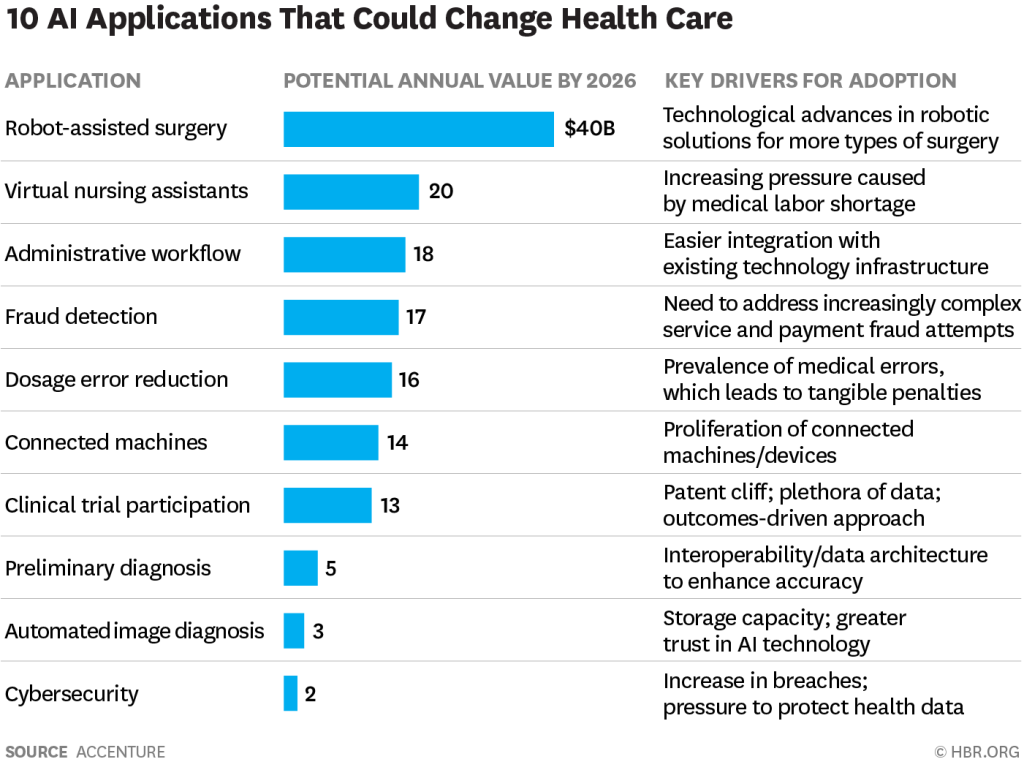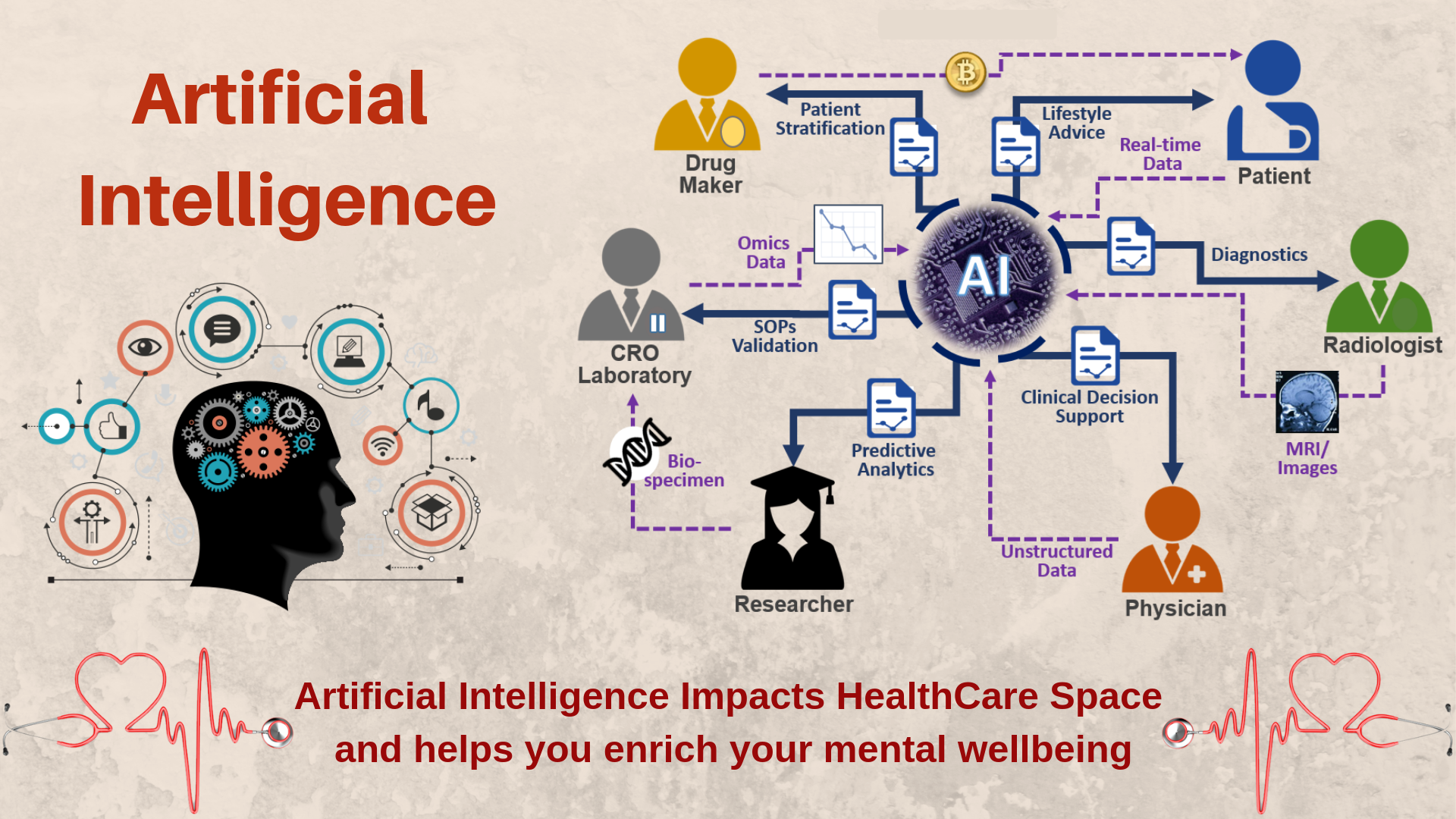While safe and effective in its current state of infancy, Artificial Intelligence in the Healthcare industry is still poised to make great strides in innovative due in part to key technologies and processes.
Forbes predicted last year that by the end of 2019, 50% of all healthcare companies will have resources dedicated to accessing, sharing, and analyzing real-world evidence for use across their organizations. For this prediction to come to fruition, many technological collaborations need to occur between engineers and hospitals to ensure the smooth transition of use for hospital staff.
Let’s get a more detailed look at the AI health market and how it has progressed and the forecast for innovation in the field in the foreseeable future.
Artificial Intelligence in healthcare
The American healthcare industry has been thriving over the years as it has been adept at adapting to the many future tech needs that allow doctors and assistants to become more precise and efficient in their daily duties. The Health Insurance Portability and Accountability Act (HIPPA) has been the gold standard for healthcare reporting since the laws were passed on August 21, 1996. These laws have been updated and added to several times over the course of the past nearly 23 years with the intention of keeping patients and their personal information safe.
As the years’ progress, more healthcare organizations are utilizing more innovative technology in their daily routines with personal patient data being stored for doctors and patients to retrieve at their request. This convenience is a double-edged sword because if the patient’s personal information is not stored properly, it can put their sensitive information at risk in the event of a data breach. With 2,181 healthcare data breaches reported from 2009 to 2017 that caused nearly 177 million healthcare records to be stolen or exposed, it shows that healthcare organizations need a little more support on the backend.
AI’s ability to review data and uncover patterns on the backend can be used to improve analyses and provide better care for patients while also reducing costs. With the explosion of technological data, there is now a strong demand to extract this information, keep it secure and utilize it. The transition to electronic health records (EHR) has led to an increase in privacy regulations which has also caused an increase in widespread treatment options for providers and payers.
Unfortunately, hospitals don’t have the necessary staff to manage the daily configuration and maintenance of systems of this caliber and complexity. AI gives healthcare organizations a self-running engine that allows them to maintain their growth well into the future without cause for concern.
AI's Human Intuition
A 2018 consumer survey conducted by Accenture found that only 29% of patients wouldn’t use AI tools specifically because they prefer meeting with a doctor in person. The main factors that patients appreciate when they think of AI integrated into the healthcare industry is the increase in availability, time savings and personalized insights. Another survey found that 61% of patients would use an artificially intelligent virtual assistant to handle their financial transactions, schedule appointments, or explain their health insurance coverage options to them. This shows that patients are ready to streamline their doctor visits and enjoy the convenience and immediate assistance that virtual AI visits provide them.
In 2015, in the U.S., there were 991 million physician office visits and only about 1 million total physicians to provide them with quality care. With glaring physician shortages in all specialties with no end in sight, hospitals need to formulate a plan of attack with AI as the centerpiece. Thankfully, hospitals have already begun to develop processes for virtual involvement in remote patient monitoring (RPM) devices. These devices allow patients to enjoy quality comfort and familiarity of their own home instead of a hospital bed. RPMs connect with wearables and other devices that monitor a patient’s health and allow them to call, text or email their doctor if they are experiencing any symptoms or complications. This solution can be deployed easily in a variety of hospitals, thereby reducing the need for a trained physician and radiologist on site to monitor these individual cases.
AI also can intuitively analyze a patient’s health deterioration in a hospital setting quicker to ensure that they are not discharged prematurely and readmitted to receive care for the same condition. With hospital readmissions currently costing U.S. hospitals $40+ billion, AI can cut those costs dramatically and increase quality of care for first-time hospital stays. As AI becomes more adept at identifying these key data points at a high level of sensitivity and specificity, it will undoubtedly lead to a completely overhaul of our healthcare system.
The one part of this level of care that AI has yet to master is mirroring human intuition and discern an outcome by thinking outside the box. This type of thinking will take much longer for AI to learn, but is something that developers are fast-tracking for the healthcare industry currently. Some scientists doubt the ability of AI to diagnose patients more effectively than human doctors, but AI experts and doctors are collaborating on solutions that will make it easier for hospitals to incorporate AI expertise into their organization on many levels.
How Artificial Intelligence can Help the Healthcare Industry
AI can help healthcare practitioners predict and identify public health threats and outcomes for at-risk patients. This will give doctors and patients more insights into ailments and collaborate to find the most prudent avenue to take to obtain the best quality care. This technology creates the most value in making the patient-facing staff more productive while simultaneously making back-end processes more efficient. The future of AI lies in something much more grand and sustainable: AI making clinical decisions that improve clinical outcomes. Clinical applications of AI are still rare though, but there is hope on the horizon with 121 health AI and machine learning companies having raised a staggering $2.7 billion in 206 deals between 2011 and 2017 according to venture capital firm Rock Health. If this level of funding continues, clinical AI applications may become a reality sooner rather than later.
Technology Pioneer, Futurist and Best-Selling Author, Michael Rogers boldly states that “healthcare is one of the disciplines that's going to benefit the most from technology innovation… and just in time, because the wheels are coming off." This quote is in response to the many technology challenges that the healthcare industry is still grappling with since doctors transitioned to scribbling prescriptions and patient notes on paper to chronicling them all in a computer system. AI gives doctors the ability to circumvent those roadblocks and enable them to configure customer treatment plans and drugs to patients based on factors such as their genetic makeup, habits, and biometrics.

Beyond these applications, AI can fundamentally reshape how hospitals deliver healthcare to their patients. AI opens the possibility of improving the quality of life for both patients, doctors, and support staff that is economically sustainable. AI-powered nurse assistants could save $20 billion annually by saving 20% of the time nurses spend on patient maintenance tasks. This technology can help to automate clerical tasks that are leading to burnout and fatigue (exhaustion, cynicism, and reduced effectiveness) that 55% of physicians experience based on the findings from a recent Stanford Medicine case study. The key point is that AI never stops working. It’s consistently analyzing and doing the grunt work that doctors and support staff are too drained to carry on with.
Making physicians more efficient and less burnt out can lead to less medical errors that cost the healthcare industry more than $17 billion every year. AI-based technologies, such as voice-to-text transcription also can improve administrative workflows and eliminate time-consuming non-patient-care activities, such as writing chart notes, filling prescriptions, and ordering tests. AI can also help to optimize the efficiencies of back office staff to take unnecessary tasks and activities off their plate that have historically consumed much of their time. Back office staff can also leverage AI to increase the speed and accuracy of their fraud detection as AI solutions automatically detect fraud and other anomalies before they become a problem.
Predictive Analytics
Growth in the AI health market is expected to reach $6.6 billion by 2021 with the health AI market will grow more than 10x2 in just the next five years. Artificial intelligence technologies that can help radiologists with pinpointing abnormalities such as heart disease and cancer and conducting image-guided procedures and biopsies are heading the charge for this monumental growth. The use of algorithms in this application could limit the progression of chronic disease at a population level and significantly improve the accuracy of screening and diagnostics. This level of instant and continuous evaluation of health data can give radiologists and doctors the ability to identify the patients who may be deteriorating based on predictive analytics.
AI can provide earlier warnings for conditions such as seizures or sepsis that often require intensive manual analysis by doctors. In these cases, the predictive analytics that AI provides hospitals ensures that there is a firm bedrock for evolution that can clue providers in to problems long before they might otherwise recognize the need to act. AI can also be used to support practitioner decisions around whether to continue care for those critically ill patients that have entered a coma following cardiac arrest. The process for making those tough decisions is often left to doctors to shoulder the responsibility. The time-consuming and subjective nature of these analyses can, instead, be left to AI to analyze and predict with the doctor’s responsibility only on verifying the analysis of the AI from a bird’s eye view.

AI-Smart Healthcare Workforce
Even though 71% of Americans surveyed by Gallup in early 2018 believe that AI will eliminate more healthcare jobs than it creates, those within the industry disagree. Having an AI algorithm analyze the data of a myriad of patients to assess long term patterns and detect subtle intricacies in the individual’s health, can impact a doctor’s decisions making around care exponentially. AI gives clinicians the ability to be more aware of nuances, thereby becoming more efficient when delivering quality care. Having AI on your side to do much of the predictive analysis makes it more likely to get ahead of developing problems, thereby ushering in a new era of clinical quality and exciting breakthroughs in patient care.
Building an AI-smart workforce for the healthcare organization will undoubtedly create a culture that will use AI to enhance efficiency, quality and outcomes. When used correctly, AI applications can supplement a physician’s ability to quickly diagnosis, monitor, and treat of patients more efficiently and accurately. As the technology’s availability becomes more widespread around the world, more physicians and patients will be more educated on its value and will continue to look for ways to incorporate more AI tools into the growing healthcare marketplace.
Propane, Digital Agency - San Francisco
1153 Mission Street
San Francisco, CA - 94103
415 550 8692